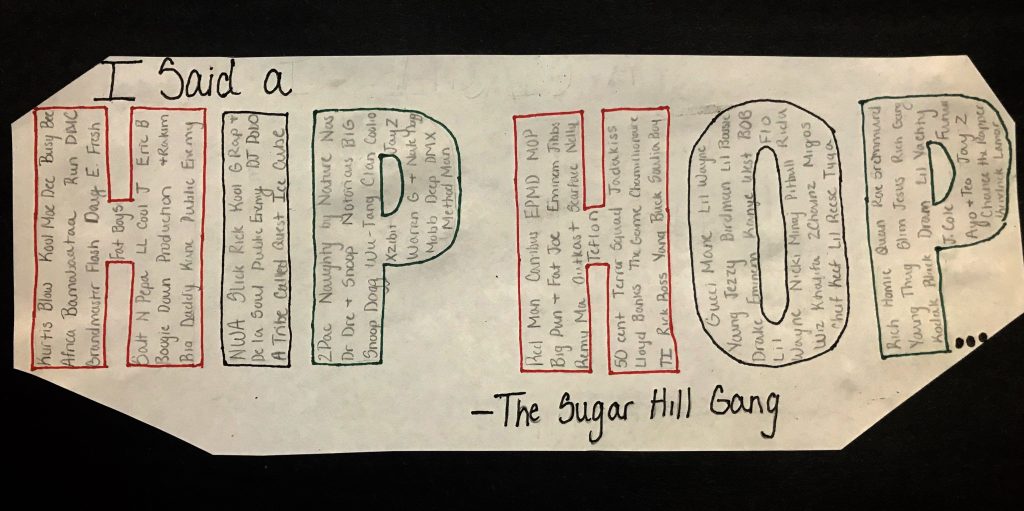Hip Hop music, like many genres, began as something that was uniquely Black. It was yet another way for African Americans to express themselves. Originating in the 1970s in New York, the earliest hip hop artists had various platforms to express themselves including MC-ing, DJ-ing, and even dancing. Hip hop pays homage to the oral traditions of African Americans dating back to their arrival in the Americas, and that tradition dates back to African kingdoms and nations. After the significant events that were World War II and the Civil Rights Movement, genres of music began to fuse and DJs would speak rhythmically over the instrumentals.
Some of the earliest DJs to rap over instrumentals included Afrika Bambaataa and Kool Herc. They paved the way for other DJs and helped usher in an era where rap became popular. The first mainstream rap song was “Rappers Delight” by the Sugar Hill Gang. The first lyric, “I said a hip hop…” is what is seen in the picture above. Other notable rappers, like Grandmaster Flash, followed in their footsteps and helped to keep rap popular.
[embedyt] https://www.youtube.com/watch?v=mcCK99wHrk0[/embedyt]
After hitting mainstream audiences and even the corporate world, hip hop music became diversified. In the 1980s the topic of hip hop songs changed depending on the particular style of the artists music and there were more women involved (i.e. Missy Elliot, Lauryn Hill, MC Lyte, Roxanne Shante). Hardcore rap allowed audiences to feel like the rapper was being real enough. Its messages were centered around gang life, sexual activities, and sometimes the black struggle and its most notable artists DJ Quik, Dr. Dre, Queen Latifah, and MC Lyte. In contrast, classic rap was about more socially acceptable topics. This made classic rap appealing to both black and white audiences, making it more mainstream. Some of its key artists include Jazzy Jeff and the Fresh Prince, MC Hammer, and Vanilla Ice (a white rapper).
Rap seems to be ever changing. The 80s and 90s were also a time where there were large differences in the sounds of rappers from different regions of the country. Hip hop artists also adapted with the times as many more rap forms became mainstream. To remain relevant, rap artists even entered other arenas of entertainment like acting (i.e. Queen Latifah & Will Smith) or TV show hosting (i.e. LL Cool J). However these actors still pay homage to the artists that came before them and still find a way to spread the same messages from their songs in the work they do now.
Personally I prefer 80s and 90s rap to the rap music that is widely popular to my generation. Don’t get me wrong I still enjoy some songs but I maintain, again in my personal opinion, that some rap music today is not really all that profound. While some hip hop artists do talk about things that are socially and politically relevant all while calling for and advocating for change, there are those that do not. I prefer to spend my time listening to those who have something to say (and rap is their way of disseminating their ideas to the masses) than trying to decipher what someone is trying to say (and yes I’m talking about mumble rapping). I’m not going to try and discredit these particular artists or say that their music is not rap but I often wonder what hip hop pioneers would have to say if they heard this music.


